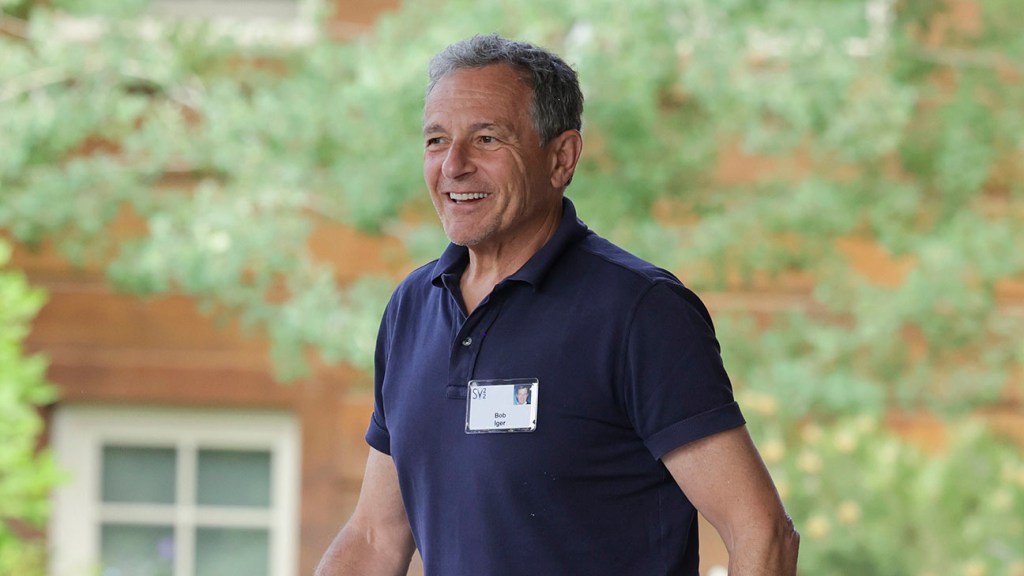In July, on the same day SAG-AFTRA called for its members to strike against Hollywood’s major studios, Bob Iger made remarks at a billionaire’s retreat that cast union asks as “not realistic.” More than 100 days later, the Disney chief gave an update on how the work stoppage has hit his company as talks with the performers’ union could be progressing closer toward a deal.
“I have the utmost respect for actors,” Iger said in a CNBC interview timed to company earnings, before saying of the status of the SAG-AFTRA talks: “I can only say that I’m optimistic that we’ll figure that out relatively soon. In terms of the impact on the business, so far, it’s been negligible. Long-term, meaning if the strike goes on much longer, it could become significant. Obviously, we’d like to try to preserve a summer of films, the entire industry is focused on that, we don’t have much time to do that.”
In its fiscal fourth-quarter, Disney said that it recorded a $387 million loss for its direct-to-consumer unit (Disney+, Hulu, ESPN+), improved from a loss of $512 million last quarter. The company also added 7 million subscribers to its core Disney+ offering to now total 112.6 million subs, while average monthly revenue per user for the platform also increased slightly from $7.31 to $7.50 quarter-to-quarter.
Iger has been moving ahead on cost-cutting and restructuring plans that he’s been implementing since his surprise return as CEO last November (the exec stated Wednesday “we’re on track to achieve roughly $7.5 billion in cost reductions”). But Hollywood’s most recognizable company has been weathering headwinds both on the advertising side amid a broader slump and during a production slow down due to the industry’s dual Writers Guild of America and SAG-AFTRA strikes.
Disney’s free cash flow — a metric used to evaluate funds left over once financial obligations are met — was estimated to be $4.89 billion for the full year amid the work stoppages, up from $1.05 billion for fiscal 2022. Year-to-date, the company’s stock has fallen about 5 percent.
Netflix, which kicked off this quarter’s Hollywood earnings season, disclosed on Oct. 18 about $1 billion in “lower-than-planned cash content spend” amid the dual strikes. The streaming giant also increased its free cash flow estimate to $6.5 billion-plus for the full year. The firm’s CFO, Spencer Neumann, said the “swing factor” in its content spend planning for film and TV projects “is going to be when the SAG-AFTRA strike resolves” but the goal is to get “at or near that $17 billion level” next year.
Paramount, which posted earnings on Nov. 3, incurred about $60 million in costs due to idle production last quarter amid the work stoppages and posted free cash flow of $377 million. “We expect to incur additional strike-related idle costs” in the upcoming quarter as well, Paramount CFO Naveen Chopra added on an earnings call, noting, “the magnitude of these incremental expenses will depend on when the active strike is resolved.” The exec also added that company expects “strong free cash flow” next quarter as well as the “strike continues to limit the production of content.”
Warner Bros. Discovery, which also disclosed earnings on Wednesday, cited in part the strikes for stagnant global streaming subscribers, which fell slightly to 95.1 million, as the work stoppages “compelled us to delay some releases,” CEO David Zaslav said. A notable bright spot was a streaming profit of $111 million in its direct-to-consumer division led by Max. CFO Gunnar Wiedenfels, whose motto is “cash never lies,” also noted on a call that free cash flow was upped to $2.1 billion for the quarter, a large increase from negative $200 million in the same quarter a year ago, with the swing attributed in part to “some benefits from the strikes.”
